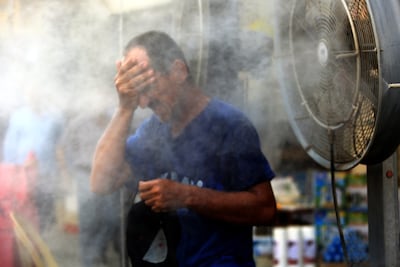A leading bloc in the Iraqi parliament is demanding action from the government to allow the swift repayment of Iraqi debt to Iran, around $11 billion owed for gas imports.
Iraq has around 131 trillion cubic feet of proven gas reserves but has to import gas from Iran because it lacks adequate infrastructure to capture and process gas associated with oil production, and has not yet developed major gas fields after decades of war and sanctions.
The Co-ordination Framework, a coalition of Iran-linked parties that dominates the Iraqi parliament with around 130 seats in the 329-member assembly, called on the government "to contact the US side and urge the immediate unlocking of the unpaid bills related to Iranian gas imports".
Iranian gas is used in the production of about 30 per cent of Iraq’s electricity, but supply has been cut off periodically in recent years.

Reasons for the cuts include delayed payments - with Iraq simply lacking funds during times of low oil revenues - and periods of unusually high demand in Iran, particularly during summer and winter, cutting into available exports.
Last week, Iran cut gas supplies once more, causing a loss of 5 gigawatts of power amid scorching summer temperatures. Iraq can produce around 24 gigawatts but summer demand is often far higher, over 30 gigawatts.
Last month, Iraq’s ministry of electricity said $11 billion in funds was held in the Trade Bank of Iraq, ready to be transferred to Iran. But the transfers have to be approved by the US, which restricts payments to Tehran due to sanctions.
Iran is limited to using the funds for the gas it exports to Iraq to pay for essential goods such as medicine and animal feed. Baghdad received a sanctions waiver from the US in June, allowing it to release $2.76 billion in payments owed to Tehran for gas, following a meeting in Riyadh between Iraqi Foreign Minister Fuad Hussein and US Secretary of State Antony Blinken.
Iraq is in the process of speeding up gas capture from oil fields in the southern governorate of Basra, and hopes to become self-sufficient in gas over the next three to five years.


